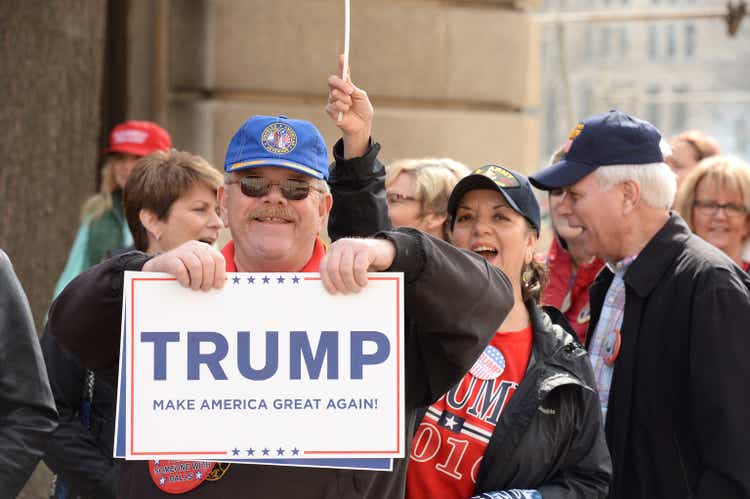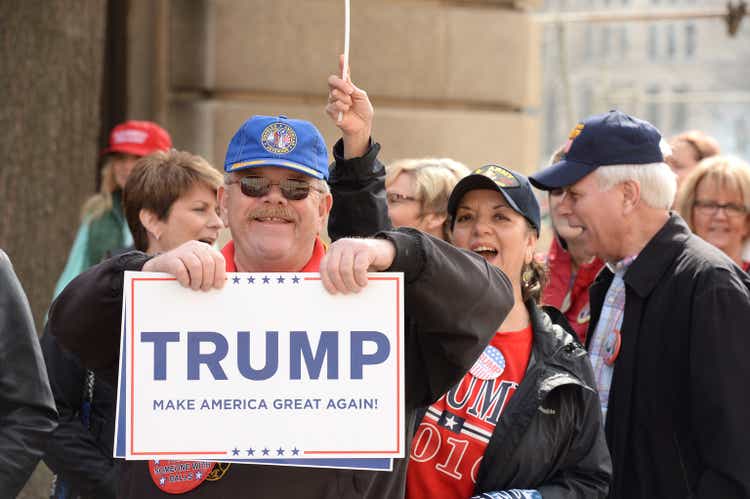
ginosphotos
Wall Street analysts continued to posit on Donald Trump’s election win and what that means for bank stocks. Chiefly, regulations are expected to lighten, less antitrust scrutiny may catalyze M&A activity, and the prospect of higher tariffs is expected to lead to a higher terminal rate.
Three key risks — regulatory, interest rate and credit — “are all flashing green,” wrote Citi analyst Keith Horowitz in a note to clients. Globally systemic important banks, such as JPMorgan Chase (NYSE:JPM), Bank of America (NYSE:BAC), Wells Fargo (WFC) and Goldman Sachs (GS), are likely to benefit from more lenient Basel III endgame rules. He expects further dilution of risk-weighted asset inflation under Basel III reforms before they’re finalized.
The new administration is also expected to create a more hospitable environment for M&A, a good sign for Capital One Financial’s (NYSE:COF) pending acquisition of Discover Financial Services (NYSE:DFS).
Citi’s rate strategist argues that a Republican sweep could provide more fiscal stimulus, driving U.S. long-end steepening. That would be positive for bank fundamentals due to fixed-rate asset repricing. Horowitz sees KeyCorp (KEY), Ally Financial (ALLY), PNC Financial Services (NYSE:PNC), Huntington Bancshares (HBAN), and State Street (STT) being the largest beneficiaries.
On the credit front, Citi doesn’t see an increased risk to commercial real estate trends as long as the five-year doesn’t return to ~4.70% levels. “Our primary concern would be too much steepening in the 5yr and long-end, which could weigh on a couple areas of credit fundamentals,” Horowitz said.
UBS analyst Erika Najarian noted that the expectation for higher tariffs, an inflationary force, could mean a higher terminal rate on the fed funds rate than what investors had expected. Already, markets are pricing in a rate of 3.75%-4.00% by the end of 2025, 100 basis points higher than a month ago. Steepening at the long end of the curve is not as ideal as short-end rates dropping. “Thus, we think a reset is needed in terms of not just NII [net interest income] expectations for ’25, but also the potential for slower/stagnant TBV [tangible book value] growth from potentially re-widening AOCI [accumulated other comprehensive income] marks on AFS [available for sale] portfolios,” Najarian said.
Like Citi, UBS sees the Trump administration settling on a “less heavy-handed” version of the Basel III endgame rules, benefitting money center banks and Category IV banks, which may be excluded.
Also banks that are still under strict regulatory scrutiny for past misbehavior, such as Wells Fargo (WFC) and Citigroup (NYSE:C), “may have a clearer path to seeing themselves out, in our view,” Najarian said.
Before the election, 2025 consensus estimates were pricing in a “nice rebound in loan growth.” However, the UBS analyst a bit more skeptical. “We’re not saying a return to mid single digit commercial (C&I) loan growth is out of the question, but if rates are higher and the capital markets are wide open, we think a material rebound in corporate activity may not be as fully translatable into loan growth activity as the market hopes,” Najarian said.
Her bank stock picks for Trump’s second stint in the White House are:
- Capital One (NYSE:COF) on improved prospects that the Discover (NYSE:DFS) deal will clear;
- Citigroup (NYSE:C): “We view C as clearly the most discounted, greatest beneficiary of a material softening of the B3 endgame.”
- Higher short-term rates could benefit: Huntington Bancshares (HBAN) and Citizens Financial Group (CFG).
BofA Securities analyst Mihir Bhatia looked at what the election can mean for consumer finance. Like several other analysts, Bhatia expects the Consumer Financial Protection Bureau, under Republican control, to withdraw its proposal to reduce credit card companies’ late fees to $8 from $30/$41. That would benefit all issuers in BofA’s coverage, but would be especially helpful for Synchrony Financial (SYF), Bread Financial Holdings (BFH), and Capital One (NYSE:COF), the analyst said.
Dear readers: We recognize that politics often intersects with the financial news of the day, so we invite you to click here to join the separate political discussion.
